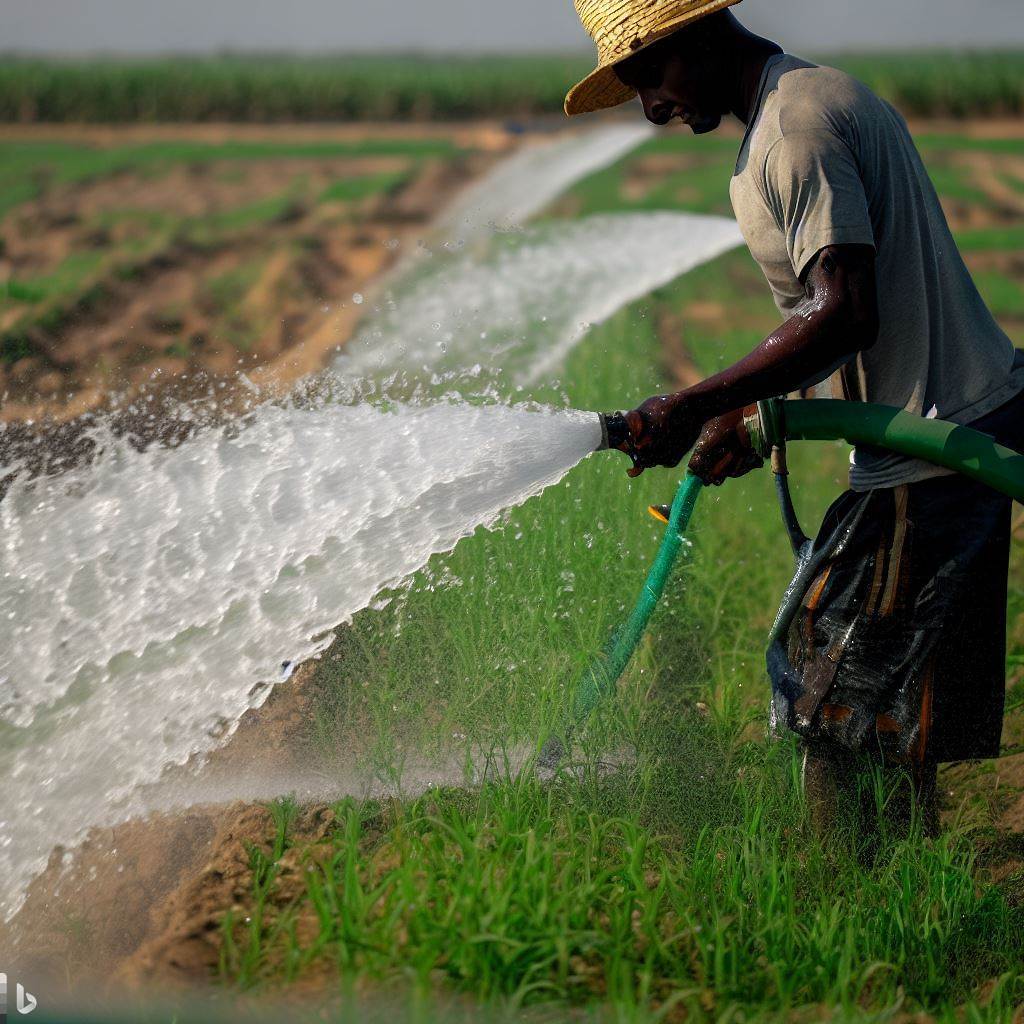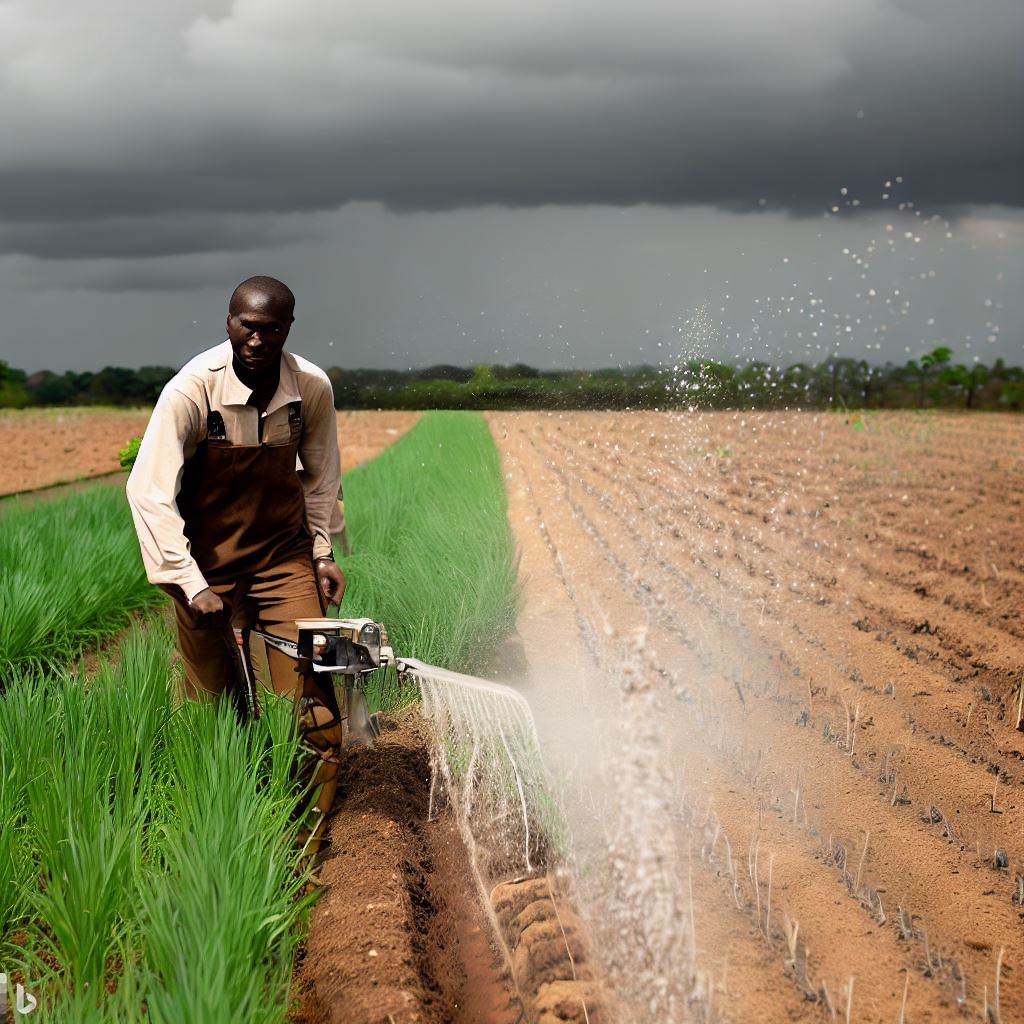Introduction
Nigeria’s economy relies on agriculture for jobs and food security, facing challenges like erratic rainfall and droughts.
Irrigation methods address challenges:
- Controlled water supply ensures steady crop growth.
- Mitigate climate change effects, enable year-round production.
- Diversify crops, enhance productivity.
- Improve growth, yields, and farmer income.
- Reduce soil erosion, efficient resource use for sustainability.
Irrigation transforms Nigerian agriculture:
- Overcomes rainfall challenges.
- Ensures year-round production.
- Boosts yields and income.
- Promotes sustainable practices.
Embracing irrigation methods guarantees food security and economic growth in Nigeria’s agricultural sector.
Traditional Irrigation Methods in Nigeria
Traditional irrigation methods are prevalent in Nigeria:
- Surface irrigation: Water flows over fields.
- Furrow irrigation: Water infiltrates through channels.
- Flood irrigation: Fields flood before draining.
Limitations of traditional methods:
- Uncontrolled water supply.
- Uneven distribution affecting growth.
- High water consumption, erosion.
- Technical, financial challenges persist.
Remaining traditional methods:
- Shadoof: Manual lifting with poles.
- Bamboo Drip: Bamboo pipes with holes.
- Perforated Clay Pots: Moisture supply.
Modern methods offer solutions:
- Drip, sprinkler, precision systems.
- Efficient water delivery, better growth.
- Resource conservation, environmental impact reduction.
- Enhanced control and monitoring.
Transition to modern methods needs:
- Infrastructure investment.
- Capacity building.
- Policy support.
Government initiatives, partnerships, farmer programs facilitate transition. Embracing modern methods enhances Nigerian agriculture.
Read: Career Spotlight: How to Become a Farm Manager in Nigeria
Modern Irrigation Methods
Introduction to modern irrigation methods such as drip irrigation, sprinkler irrigation, and center pivot irrigation.
Explanation of how these methods are more efficient and effective than traditional ones.
Advantages of modern irrigation methods in terms of water conservation, precision, and decreased labor requirements.
Introduction to Modern Irrigation Methods
In recent years, there has been a significant shift from traditional irrigation methods to modern techniques in Nigerian farms.
These modern methods, such as drip irrigation, sprinkler irrigation, and center pivot irrigation, have revolutionized the way crops are watered.
Efficiency and Effectiveness of Modern Irrigation Methods
Compared to traditional methods like flood irrigation, modern irrigation techniques offer enhanced efficiency and effectiveness.
Drip irrigation, for example, delivers water directly to the roots of plants, minimizing water wastage through evaporation and runoff.
Sprinkler irrigation evenly distributes water over the field, ensuring uniform crop growth.
Center pivot irrigation uses rotating arms to deliver water, covering large areas efficiently.
Advantages of Modern Irrigation Methods
Modern irrigation methods offer several advantages over traditional ones, making them a game-changer for Nigerian farms.
Water Conservation
One of the significant benefits of modern irrigation methods is water conservation.
Drip irrigation, for instance, can reduce water usage by up to 50% compared to flood irrigation.
By delivering water directly to the plant roots, these methods minimize water loss due to evaporation and ensure efficient utilization.
Precision
Modern irrigation methods provide precise control over the amount and timing of water delivered to crops. This precision helps optimize plant growth and use water resources more efficiently.
Farmers can adjust the irrigation systems based on specific crop requirements and weather conditions, resulting in healthier plants and higher yields.
Decreased Labor Requirements
Traditional irrigation methods often require extensive manual labor, such as digging trenches and manually transporting water.
Modern techniques significantly reduce labor requirements, allowing farmers to focus on other essential farming activities.
Automated systems like sprinkler and center pivot irrigation eliminate the need for constant monitoring and manual intervention, saving both time and effort.
The adoption of modern irrigation methods has brought about a paradigm shift in Nigerian agriculture.
Drip irrigation, sprinkler irrigation, and center pivot irrigation have proven to be more efficient, effective, and advantageous compared to traditional techniques.
With improved water conservation, precision, and decreased labor requirements, these methods have become a game-changer for Nigerian farms, enhancing crop yields and sustainable farming practices.
Read: Farm Manager Salaries: An Insightful Analysis for Nigeria
Government Initiatives to Promote Irrigation Methods
The Nigerian government employs diverse programs to boost agricultural productivity and income:
- Agricultural Transformation Agenda (ATA) prioritizes irrigation infrastructure and services, reducing reliance on rainfall.
- ATA focuses on capacity building and training, equipping farmers with effective irrigation techniques.
- Growth Enhancement Support (GES) scheme provides affordable irrigation technologies, elevating water efficiency.
- GES leads to up to 300% crop yield increase and higher farmer incomes.
Government partnerships in Kano state establish Hadejia Valley Irrigation Scheme, revolutionizing agriculture and incomes.
Interventions include:
- Better irrigation access.
- Training.
- Affordable technologies.
Government initiatives uplift agriculture, improve yields, increase incomes, and transform livelihoods for a prosperous Nigerian future.
Read: Impact of Technology on Farm Management in Nigeria
Success Stories of Nigerian Farms using Irrigation
Profiles of successful Nigerian farmers who have adopted modern irrigation methods
Mr. Ahmed Abdullahi: A farmer from Kano State who switched to drip irrigation for his vegetable farm.
Mrs. Funke Adekunle: A rice farmer in Ogun State who implemented sprinkler irrigation on her farm.
Mr. Ibrahim Musa: A maize farmer in Niger State who embraced center pivot irrigation for his crop.
Improvements in crop yield, quality, and income achieved by these farmers
Nigerian farmers experienced remarkable results with modern irrigation techniques:
- Mr. Abdullahi achieved a 50% increase in vegetable yield using drip irrigation.
- Mrs. Adekunle’s rice quality improved, boosting demand and prices.
- Mr. Musa’s maize production grew 30% with center pivot irrigation.
Implementation process and challenges:
- Mr. Abdullahi received support for drip irrigation setup from an extension officer.
- Mrs. Adekunle faced water pressure issues in her sprinkler system, needing adjustments.
- Mr. Musa struggled with infrastructure acquisition for center pivot irrigation due to power and land leveling issues.
Despite challenges, they succeeded, revolutionizing farming and achieving better living standards.
Benefits of modern irrigation:
- Efficient water control.
- Increased yields for food and commercial markets.
- Premium prices for quality produce.
- Enhanced brand reputation.
Success stories inspire fellow farmers and government efforts for training, support, and infrastructure development.
Nigerian farmers’ achievements emphasize irrigation’s potential to transform agriculture sustainably and profitably, promoting food security.
Read: Contribution of Animal Geneticist to Biodiversity in Nigeria

Environmental and Economic Impacts of Improved Irrigation
Improved irrigation methods have had significant positive impacts on both the environment and the economy in Nigeria.
These methods have not only reduced water waste and soil erosion, but have also contributed to increased agricultural productivity, food security, poverty alleviation, and economic benefits for farmers, local communities, and the nation as a whole.
Positive Environmental Impacts
One of the major advantages of improved irrigation methods is the reduction in water waste.
Traditional flood irrigation techniques often led to significant water loss through evaporation and runoff.
However, with improved methods such as drip irrigation and precision sprinklers, water usage can be minimized, ensuring efficient water distribution directly to the crops.
Furthermore, improved irrigation methods help to prevent soil erosion.
Flooding fields with water causes topsoil to erode, leading to loss of nutrients and reduced soil fertility over time.
In contrast, controlled irrigation systems allow for the gradual and targeted delivery of water, minimizing the risk of erosion and preserving the quality of the soil.
Contribution to Food Security and Poverty Alleviation
In Nigeria, increased agricultural productivity resulting from improved irrigation methods plays a crucial role in ensuring food security.
As irrigation helps maintain consistent water supply, farmers can grow crops throughout the year, regardless of rainfall patterns.
This enables them to diversify their produce and reduce reliance on rain-dependent agriculture, ultimately increasing overall food production.
Moreover, improved agricultural productivity contributes to poverty alleviation.
By enhancing crop yields, farmers can generate surplus produce for sale, leading to increased income. This, in turn, improves their standard of living and reduces their vulnerability to food insecurity and poverty.
Economic Benefits for Farmers, Local Communities, and the Nation
Improved irrigation methods have significant economic benefits at various levels.
For farmers, these methods not only enhance productivity but also reduce production costs.
Water-saving techniques such as drip irrigation minimize the need for manual labor and reduce energy consumption, translating into lower operating expenses and higher profits.
At the local community level, improved irrigation leads to increased employment opportunities.
As agriculture becomes more productive, farmers can expand their operations, creating jobs in agricultural support services
Such as equipment maintenance, irrigation system installation, and crop processing.
This stimulates local economic development and helps to uplift rural communities.
On a national scale, the economic benefits of improved irrigation are substantial.
Higher agricultural productivity contributes to increased export potential, leading to foreign exchange earnings.
Additionally, by relying less on food imports, Nigeria can enhance its self-sufficiency, reduce import expenditure, and strengthen its overall economic resilience.
Improved irrigation methods have brought about numerous positive environmental and economic impacts in Nigeria.
These methods have reduced water waste, minimized soil erosion, increased agricultural productivity, ensured food security, alleviated poverty,
And provided economic benefits for farmers, local communities, and the nation as a whole.
Embracing and further promoting these game-changing irrigation methods will continue to support sustainable and prosperous agricultural practices in Nigeria.
Conclusion
The significance of irrigation methods for Nigerian farms cannot be overstated.
It has the potential to revolutionize agricultural development in the country and address the challenges of unpredictable rainfall patterns.
By adopting suitable modern irrigation techniques, farmers can ensure sustainable farming practices and increase their productivity and yields.
This, in turn, will contribute to food security and economic growth in Nigeria.
It is crucial for farmers to explore and adopt these innovative irrigation methods, such as drip irrigation, sprinkler irrigation, and hydroponics, among others.
These methods not only conserve water but also minimize soil erosion and nutrient leaching.
Additionally, the use of irrigation methods enables farmers to have greater control over their crops’ water supply, allowing for precise water and nutrient management.
This leads to healthier plants, higher quality produce, and ultimately, better profits.
In light of the growing climate change impacts on agriculture, it is essential for Nigerian farmers to adapt to these changing conditions.
Embracing modern irrigation techniques will not only mitigate the risks associated with unreliable rainfall but also improve overall farm productivity and resilience.
Irrigation methods have proven to be a game-changer for Nigerian farms.
They offer a practical solution for agricultural development in Nigeria, ensuring sustainable farming practices, increased food production, and economic prosperity.
It is high time for farmers to embrace and reap the benefits of modern irrigation techniques for a brighter and more secure future.




